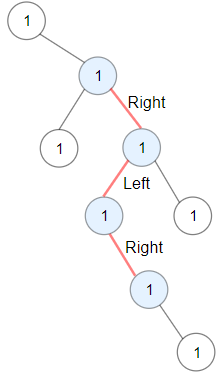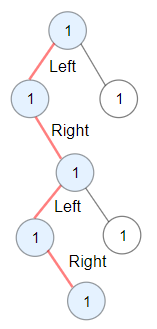Welcome to Subscribe On Youtube
1372. Longest ZigZag Path in a Binary Tree
Description
You are given the root of a binary tree.
A ZigZag path for a binary tree is defined as follow:
- Choose any node in the binary tree and a direction (right or left).
- If the current direction is right, move to the right child of the current node; otherwise, move to the left child.
- Change the direction from right to left or from left to right.
- Repeat the second and third steps until you can't move in the tree.
Zigzag length is defined as the number of nodes visited - 1. (A single node has a length of 0).
Return the longest ZigZag path contained in that tree.
Example 1:

Input: root = [1,null,1,1,1,null,null,1,1,null,1,null,null,null,1] Output: 3 Explanation: Longest ZigZag path in blue nodes (right -> left -> right).
Example 2:

Input: root = [1,1,1,null,1,null,null,1,1,null,1] Output: 4 Explanation: Longest ZigZag path in blue nodes (left -> right -> left -> right).
Example 3:
Input: root = [1] Output: 0
Constraints:
- The number of nodes in the tree is in the range
[1, 5 * 104]. 1 <= Node.val <= 100
Solutions
-
/** * Definition for a binary tree node. * public class TreeNode { * int val; * TreeNode left; * TreeNode right; * TreeNode() {} * TreeNode(int val) { this.val = val; } * TreeNode(int val, TreeNode left, TreeNode right) { * this.val = val; * this.left = left; * this.right = right; * } * } */ class Solution { private int ans; public int longestZigZag(TreeNode root) { dfs(root, 0, 0); return ans; } private void dfs(TreeNode root, int l, int r) { if (root == null) { return; } ans = Math.max(ans, Math.max(l, r)); dfs(root.left, r + 1, 0); dfs(root.right, 0, l + 1); } } -
/** * Definition for a binary tree node. * struct TreeNode { * int val; * TreeNode *left; * TreeNode *right; * TreeNode() : val(0), left(nullptr), right(nullptr) {} * TreeNode(int x) : val(x), left(nullptr), right(nullptr) {} * TreeNode(int x, TreeNode *left, TreeNode *right) : val(x), left(left), right(right) {} * }; */ class Solution { public: int ans = 0; int longestZigZag(TreeNode* root) { dfs(root, 0, 0); return ans; } void dfs(TreeNode* root, int l, int r) { if (!root) return; ans = max(ans, max(l, r)); dfs(root->left, r + 1, 0); dfs(root->right, 0, l + 1); } }; -
# Definition for a binary tree node. # class TreeNode: # def __init__(self, val=0, left=None, right=None): # self.val = val # self.left = left # self.right = right class Solution: def longestZigZag(self, root: TreeNode) -> int: def dfs(root, l, r): if root is None: return nonlocal ans ans = max(ans, l, r) dfs(root.left, r + 1, 0) dfs(root.right, 0, l + 1) ans = 0 dfs(root, 0, 0) return ans -
/** * Definition for a binary tree node. * type TreeNode struct { * Val int * Left *TreeNode * Right *TreeNode * } */ func longestZigZag(root *TreeNode) int { ans := 0 var dfs func(root *TreeNode, l, r int) dfs = func(root *TreeNode, l, r int) { if root == nil { return } ans = max(ans, max(l, r)) dfs(root.Left, r+1, 0) dfs(root.Right, 0, l+1) } dfs(root, 0, 0) return ans }